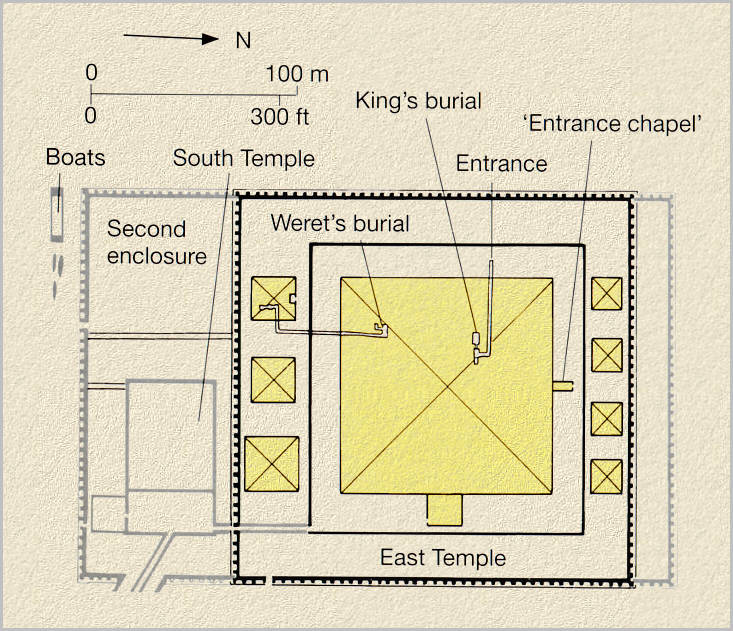The Pyramid is located northeast of Red Pyramid of Dahshur.
It can be seen from South Sakkara and is visible if one looks on the right
on the road up to Dahsur, after entering the desert. It is next to an oil
refinery is thus difficult to reach. To easiest approach is from the area
of the Pyramid of Pepi II in South Sakkara. Senwosret was the Fifth King of
the twelfth Dynasty and is the most northern pyramid at Dahshur. Senwosret
III built the largest pyramid of the 12th dynasty. Herodotus remarked, during
his 5th century BCE visit, that this was the most significant pyramid of the
Middle Kingdom. The Pyramid is flanked by 7 smaller pyramids on the north
and south sides. These were originally thought to be mastaba, but work by
Arnold in 1997 proved that they are indeed pyramids. The pyramid complex was
expanded on at least two phases. In the first the outer enclosure was nearly
square and contained in inner enclosure wall, the pyramid with a small temple
at the centre of its east side and an 'entrance chapel' at the centre of its
north side and shaft tombs of royal women. In the second phase the enclosure
was extended both north and south. The southern extension enclosed a new temple.
A causeway was also added in this phase. No valley temple is known so far.
The eastern mortuary temple is small in comparison to pervious examples. The
south temple was also completely destroyed, probably in Ramessid times, though
Arnold could read its outline in the preserved foundations. On the north of
the pyramid was a subterranean gallery for royal women more complex than the
superstructures might suggest. A principal shaft gave access to a long vaulted
corridor connecting four sets of chambers, each for a sarcophagus, and canoptic
chest, plus one or two niches. Another gallery on a lower level communicated
with 8 niches containing sarcophagi, two of which were inscribed - for princess
Ment and Senet-senebi. In a pit in the central corridor of the lower gallery
de Morgan found a chest, once inlaid with the name Sit-Hathor, containing
333 pieces of her treasure. A gold pectoral with the name of Senwosret II
and a scarab was inscribed with that of Senwosret III. The next he found another
treasure, belonging to princess Merit, which contained many of the same elements
as Sit-Hathor's but even more extensive. On the south side of the King's pyramid
were more tombs of royal women. In 1991 the shaft of 'mastaba' 9 was discovered.
A tunnel leads to an antechamber, burial chamber and canoptic chamber actually
under the southwest corner of the king's pyramid. A granite sarcophagus fills
the west end of the burial chamber. The name Waret, wife of Senwosret II and
mother of Senwosret III, was found on a canoptic jar and an inscribed board.
It is interesting the queen mother under the southwest quadrant of her son's
pyramid given the emphasis of that direction throughout pyramid history. Outside
this corner of Senwosret's enclosure was a mudbrick-vaulted building buried
in the desert.. Immediately to the east of this was a 'fleet' of at least
six wooden boats, possibly more, each 6 m long. One or more wooden sleds were
buried with them.
